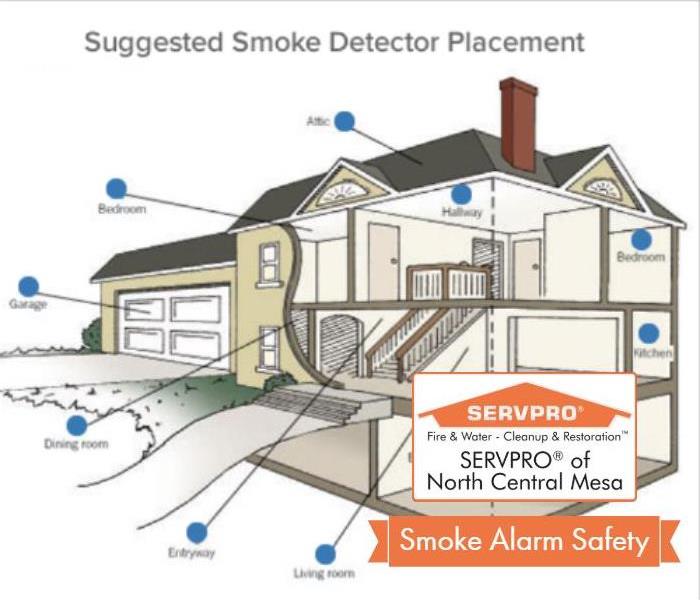Smoke Alarm Safety Mesa, AZ
4/22/2019 (Permalink)
May 4th is Wildfire Community Preparedness day! Wildfires have devastating effects on the local environment, but did you know that from 2012 to 2016 11,670 were injured and 2560 civilians died from house fires! Additionally $6.5 billion in damage was caused by the same house fires.
Smoke alarms save lives. Smoke alarms that are properly installed and maintained play a vital role in reducing fire deaths and injuries. If there is a fire in your home, smoke spreads fast and you need smoke alarms to give you time to get out.
Smoke Alarm Facts and Stats
- In 2009-2013, smoke alarms sounded in over half (53%) of the house fires reported to U.S. fire departments.
- Three of every five house fire deaths resulted from fires in homes without smoke alarms (38%) or non-working smoke alarms (21%).
- The death rate for every 100 reported home fires was over twice as high in homes that didn’t have any working smoke alarms compared with the rate in homes with working smoke alarms (1.18 deaths vs. 0.53 deaths for every 100 fires).
- In fires in which the smoke alarms were there but did not operate, almost 50% of the smoke alarms had missing or disconnected batteries.
- Dead batteries caused just under 25% of the smoke alarm failures.
Smoke Alarm Safety Tips
- A closed door could slow the spread of smoke, heat & fire. You should install smoke alarms in every sleeping room and outside every separate sleeping area. Install alarms on each level of the home.
- Smoke alarms should be interconnected. So, when one sounds, they will all sound.
- Large homes might need additional smoke alarms.
- Homeowners should test smoke alarms at least once a month. Make sure the alarm is working by pressing the test button.
- There are two kinds of alarms. Ionization smoke alarms react more quickly to flaming fires. Photoelectric alarms respond more quickly to smoldering fires. A best practice is to use both types of alarms in the home.
- When your smoke alarm(s) sound, go outside and stay outside.
- Practice escape routes from your home with your family or roommates.
- Replace every smoke alarm in your home every 10 years.
- Smoke alarms are inexpensive and are worth the lives they help save.
- Smoke alarms with dead or missing batteries are the same as having no smokes alarm at all. Smoke alarms only work when they are properly installed and regularly tested. Take care of your smoke alarms according to the manufacturer’s instructions.






 24/7 Emergency Service
24/7 Emergency Service
